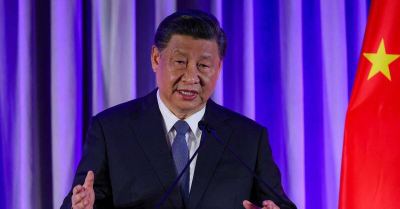Reuters-From spy balloons to chocolates Chinese propaganda frames Xis US pivot
November 16, 2023 3 min 623 words
这篇报道突显中国宣传的变化,从过去美中紧张关系的抱怨转向现在强调习近平与拜登的友好交往。通过强调习近平在爱荷华州的过去访问,共享巧克力,以及与美国商界的交流,中国试图向国内展示习近平与拜登平等对话的形象,突显其稳定中美关系的决心。报道中提到中国国内媒体强调人民之间的关系,强调合作的潜力,以及对亚太地区的重要性。然而,就连中国社交媒体上也有一些用户对报道的调子提出批评,指出报道未触及一些关键问题。整体而言,中国似乎在通过此次峰会改变对外宣传的调子,强调与美国的友好关系,同时也表达对中美关系的期望。
What a difference eight months makes: In March, shortly after the U.S. shot down a suspected Chinese surveillance balloon, President Xi Jinping blamed it for challenges faced by China's economy, complaining of "all-round containment".
Then on Wednesday, U.S. President Joe Biden and Xi agreed to open a presidential hotline, resume military-to-military communications and work to curb fentanyl production, showing tangible progress in their first face-to-face talks in a year at a summit in California.
While key issues like U.S. sanctions on chip exports remain unresolved, Chinese state media is now striking a different tone, focusing on Xi's smile during past trips to Iowa, fireside chats with its residents, and sharing chocolates with Biden.
Clips from the summit on China's social media show the two leaders walking in gardens at the site of the talks, and chatting by Xi's official limousine, with discussion of U.S. tech curbs and tension over Taiwan featuring less prominently.
The Chinese rhetoric seeks to show Xi to a domestic audience as Biden's equal and highlights his desire to stabilise ties as China grapples with a moribund economy, analysts say. It also sends a signal of approval to the bureaucracy and businesses on engaging with Americans.
"It reflects a very strong desire on the part of Chinese leaders to stabilise relations with the U.S. and push for more cooperation," said Li Mingjiang, international relations scholar at the Rajaratnam School of International Studies in Singapore.
"There's this fundamental message in the Chinese narrative that the Chinese leader is capable of managing China-U.S. relations ... he is the one who gives instructions to the U.S. and the American leadership on how to manage the bilateral ties."
China's domestic propaganda machine worked overtime to pave the way for Xi's pivot, also evident at a dinner with U.S. executives, when he pledged that China was ready to be a "partner and friend" of the U.S. and there was "plenty of room for bilateral cooperation".
With official ties still strained, Chinese state media has focused on relations between the people and emphasised the potential for cooperation and importance of the summit for the Asia-Pacific region.
"The international community watches with bated breath, recognising the weight of this meeting," the state news agency Xinhua said in an editorial. "When China-U.S. relations are good, the region benefits; when relations sour, the region suffers."
Xinhua also ran a 1,500-word report reminiscing about Xi's past visits to the U.S..
"Xi never forgets his American friends and believes that people hold the key to state-to-state relations," the news agency said.
The report cited Iowans who helped coordinate a 1985 trip Xi made to the state as a young official, describing his "smile that would not stop", and lauding his curiosity. It also described Biden and Xi sampling chocolates from a box during a past exchange.
Gary Dvorchak, an Iowan considered by Xi an old friend of China, said Xi's fondness for Iowa was genuine but that the Chinese leader also used his ties to the state for propaganda value.
“It humanises him and it gives him an ability to show a connection to the American people and bypass the American media,” said Dvorchak.
“They use it when they need to bolster his support domestically or internationally,” said Dvorchak, who said he thought it was canny public relations.
“Part of the reason it works is because those feelings are real.”
But even on censored Chinese social media users found ways to make critical comments on the tone of the official commentary.
"Where did the relations improve? Tariffs, chips, studying overseas, none of these are mentioned."
On the Weibo Chinese microblogging site, the most popular hashtag on Thursday still harked back to tension over Taiwan: "China must be and will be reunified."

